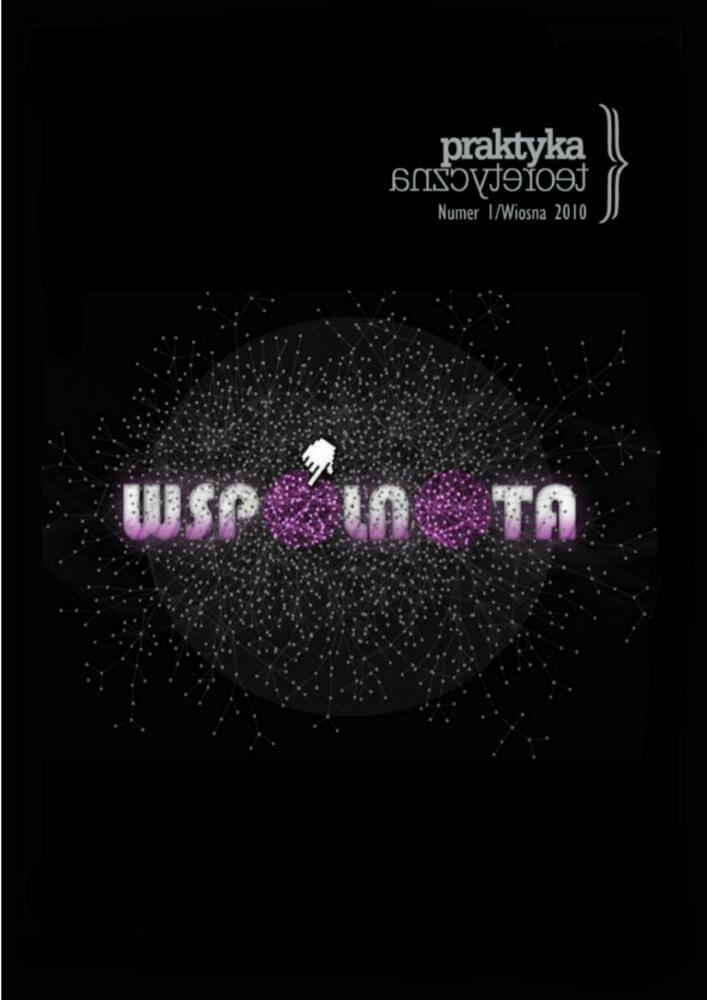Abstrakt
Celem tekstu jest rekonstrukcja podstaw ontologicznych, epistemologicznych oraz etycznych projektu posthumanistycznego (zwanego też teorią lub narzędziem posthumanistycznym) na podstawie analizy propozycji teoretycznych Karen Barad, Gillesa Deleuze'a i Felixa Guattari'ego oraz Donny Haraway. Tylko dzięki tak precyzyjnemu zdefiniowaniu narzędzia teoretycznego, możliwe będzie zadanie pytania o wspólnotę postludzką oraz posthumanistyczną politykę.Bibliografia
Barad K. 2003. “Posthumanist Performativity: Toward an Understanding of How Matter Comes to Matter.”. Signs: Journal of Women in Culture and Society. 28 (3) : 801-831 .
Barad K. 2007. Meeting the Universe Halfway: Quantum Physics and the Entanglement of Matter and Meaning. Durham-London: Duke Press.
Birke L., M. Bryld, N. Lykke. 2004. Animal Performances: An Exploration of Intersections between Feminist Science Studies and Studies of Human/Animal Relationships. “Feminist Theory”. 5 (2) : 167-183.
Bostrom N. 2010. What is Transhumanism? http://www.nickbostrom.com/
Bostrom N. A. 2005. “History of Transhumanist Thought”. Journal of Evolution and Technology. 14 (1) : 1-25.
Butler J. 1993. Bodies that Matter: On Discursive Limits of „Sex”. New York: Routledge.
Colebrook C. 2000. Is Sexual Difference a Problem? In Deleuze and Feminist Theory. Edinburgh: Edinburgh University Press.
Deleuze G. 2004. Desert Islands and Other Texts (1953-1974). Los Angeles: Semiotext(e).
Deleuze G.. Guattari F. 1987. A Thousand Plateaus. Minneapolis-London: University of Minnesota Press.
Deleuze G.. Guattari F. 1994. What is Philosophy? New York: Verso.
Derrida J. 2002. “The Animal that Therefore I Am (More to Follow)”. Critical Inquiry. 28 (2) : 369-418.
Foucault M. 1994 The Order of Things: An Archeology of Human Sciences. New York: Pantheon Books.
Graham E.L. 2002. Representations of the Post/Human: Monsters. Aliens and Others in Popular Culture. Manchester: Rutgers University Press.
Haraway D. 1991. Simians. Cyborgs and Women: The Reinvention of Nature. New York: Routladge.
Haraway D. 1997. .Modest−Witness@Second−Millennium. FemaleMan−Meets−OncoMouse: Feminism and Technoscience. New York-London: Routledge.
Haraway D. 2007. When the Species Meet. Minneapolis-London: University of Minneapolis Press.
Hassan I. 1977. “Prometheus as Performer: Toward a Posthumanist Culture?” The Georgia Review. 31 (4) : 830-850.
Latour B. 2004. Politics of Nature. Harvard: Harvard University Press.
Rossini M. 2006. “To the Dogs: Companion Speciesism and the New Feminist Materialism”. Kritikos. 3 (Sept) : 1-25.
Tuin I. Dolphijn 2009. R. Pushing Dualism to an Extreme: On Philosophical Impetus of a New Materialism.
Licencja
Autorzy:
„Praktyka Teoretyczna” jest pismem, które chce realizować idee wolnego dostępu do wiedzy i poszerzania domeny dobra wspólnego. Ma służyć rozwojowi nauki i krytycznej refleksji w Polsce i na świecie w imię idei wolnego dostępu do wiedzy (Open Access). Całe pismo jest udostępniane za darmo w Internecie na warunkach licencji CC-BY-NC-SA (Uznanie autorstwa-Użycie niekomercyjne-Na tych samych warunkach 4.0 Międzynarodowe) w wersji 4.0 (szczegółowe warunki: http://creativecommons.org/licenses/by-nc-sa/4.0/). Artykuły w nim zamieszczone mogą być dowolnie przechowywane, kopiowane, drukowane, rozpowszechniane i wykorzystywane do celów naukowo-dydaktycznych przy zachowaniu warunków licencji. Apelujemy tylko o uznanie autorstwa i podanie źródła w myśl przyjętych w środowisku naukowym standardów.
Nie ma natomiast możliwości komercyjnego wykorzystania zgromadzonych zasobów bez pisemnej zgody wydawcy. Dostęp do czasopisma nie może być dystrybuowany za opłatą czy w jakikolwiek inny sposób limitowany przez inne podmioty.
Autorzy tekstów przyjętych do publikacji w czasopiśmie „Praktyka Teoretyczna” są zobowiązani do wypełnienia, podpisania i odesłania na adres redakcji umowy o udzielenie nieodpłatnej licencji do utworów, z zobowiązaniem do udzielania sublicencji CC [PL.pdf, PL.doc, EN.pdf, EN.doc].
Zgodnie z umową, autorzy tekstów opublikowanych w czasopiśmie „Praktyka Teoretyczna” udzielają wydawcy czasopisma niewyłącznej i nieodpłatnej licencji oraz zezwalają na użycie sublicencji Creative Commons Uznanie autorstwa-Użycie niekomercyjne-Na tych samych warunkach 4.0 Międzynarodowe (CC-BY-NC-SA 4.0).
Autorzy zachowują prawa do dalszego, swobodnego rozporządzania utworem.
Autorzy nadsyłanych artykułów powinni upewnić się, czy wykorzystywane przez nich materiały nie są chronione prawami autorskimi na rzecz innych osób i ponoszą odpowiedzialność za ewentualne uchybienia w tym względzie.
